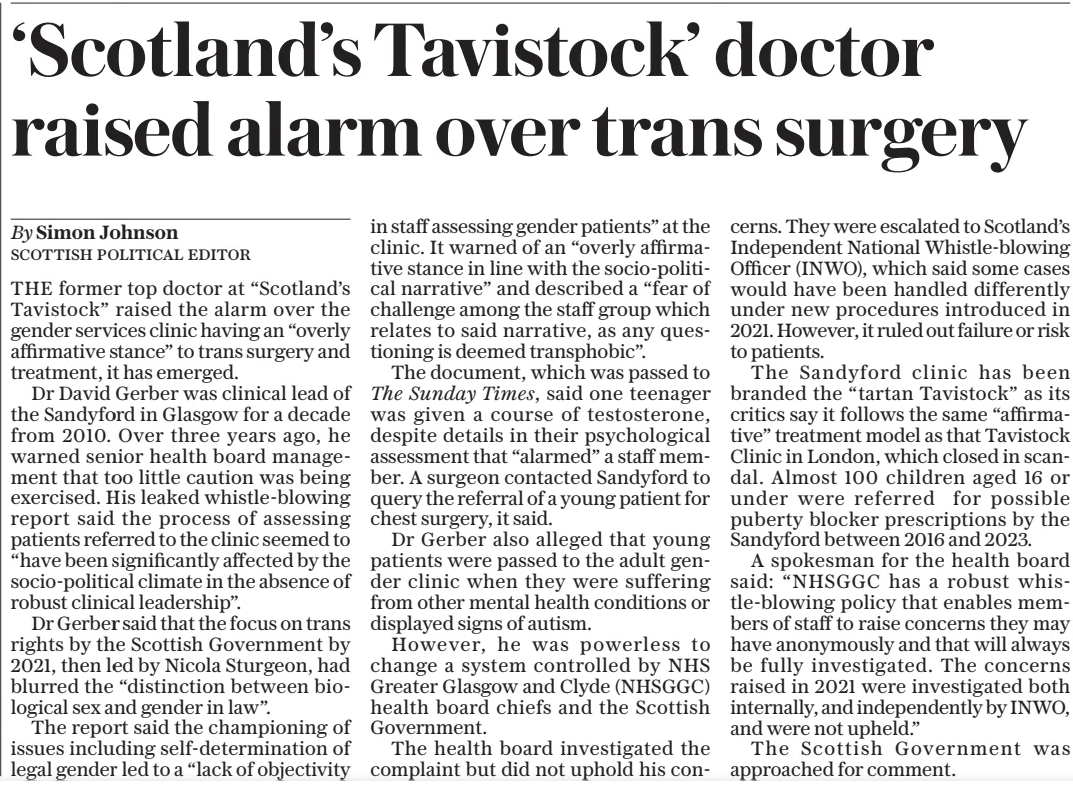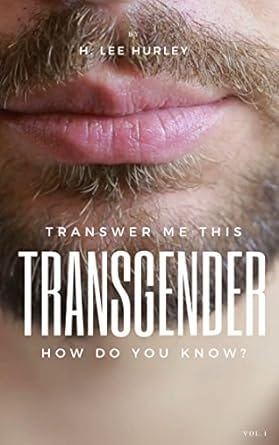The Trans Agenda
[6 October 2024]
Welcome to The Trans Agenda: The papers, a newsletter that will arrive in your inbox every week if you are subscribed.
Just a quick note before I start that it is my birthday next Saturday and how that goes will determine whether next week’s edition will be out on Sunday or Monday.
Full paper review below.
PAPER STATS
September saw a total of 66 articles across The Telegraph, Times, Mail and Guardian/Observer. The Telegraph alone accounted for almost 50% of those with 32. The Times and the Mail ‘only’ had 13 each while the Guardian had eight.
August saw 118 (Guardian 15, Times 24, Mail 27, Telegraph 52).
When looking at the figures for the months when I first started this (under a Tory government vs a Labour one), I was somewhat surprised to find that the numbers haven’t really changed that much, even though it feels, as I go through the papers, like it has. Perhaps I’m just immune to a lot of it now.
May, my first full month of counting, saw 116 (Guardian 8, Times 33, Mail 30, Telegraph 45) while June had 86 (Guardian 5, Times 24, Mail 28, Telegraph 29). I’m still missing some numbers from July, when I was on holiday, so will leave those out for now.
While September was certainly the quietest month so far, the main difference, however, seems to be in the tone and level of vitriol, which has certainly dropped off since the Tories were shown the door, even if the numbers haven’t fully.
NEWS
…that didn’t make the papers
NHS trans care officials speak at anti-trans hate group SEGM’s conference [Erin Reed]
- NHS officials involved in shaping the future of transgender healthcare in the UK are participating in a conference organised by the Society for Evidence in Gender Medicine (SEGM), a group labelled as an anti-LGBTQ+ hate organisation by the Southern Poverty Law Center.
SEGM is known for opposing transgender rights and promoting conversion therapy. Among the NHS participants are figures linked to the controversial Cass Review and future transgender care trials in the UK.
The involvement of these officials has raised serious concerns about the potential for harmful, anti-trans conversion therapy practices becoming more prominent in the UK’s healthcare system.
No crimes of misgendering reported despite surge in hate crime cases [BBC]
- Since the introduction of Scotland’s Hate Crime and Public Order Act in April 2024, hate crimes have surged by 63%, with over 5,400 incidents recorded, primarily related to race, religion and age.
Anti-trans activists had warned that the law would lead to a flood of “misgendering” cases, overwhelming the legal system. However, Deputy Chief Constable Alan Speirs confirmed that “no crimes of misgendering” have been reported under the new law. Not one.
The majority of hate crimes recorded were consistent with previous legislation, debunking concerns of over-policing trans-related issues. Despite early, and disingenuous, criticism, including from figures like JK Rowling, the focus on gender has, unsurprisingly, proven “disproportionate” to the actual number of cases, with race and religion being far more prevalent targets.
Census reveals how many GCs live in Scotland [Holyrood]
- The 2022 Scottish census revealed that out of a population of 5,436,600, fewer than 3,000 people (0.05%) self-identified their religion as “believer in biology,” a protest response coordinated by anti-trans group, For Women Scotland.
In contrast, 19,990 individuals (0.37%) identified as trans or non-binary.
This data shows that the so-called “Gender Critical” movement, which loudly and viciously opposes transgender rights, represents a tiny minority—there are at least 6.6 times more trans and non-binary people than “believers in biology.”
Despite their loud presence on social media, where many use multiple sock accounts, the census confirms what we already knew – that they are a small fringe group.
Non-binary customers awarded compensation over discriminatory forms [Telegraph]
- Non-binary customers have won compensation after facing discrimination from financial services firms MoneySuperMarket and Transunion for not providing non-binary options on their application forms.
The Financial Ombudsman Service awarded Mx B £200 from MoneySuperMarket and Mx E £350 from Transunion for the “distress and disappointment” caused.
Both companies argued their systems were limited by legacy or partner requirements, but the Ombudsman ruled that they did not act swiftly enough to accommodate non-binary identities. Both firms are now working to improve their systems to include non-binary options.
For Women Scotland compiling information on trans athletes [For Women Scotland]
- The anti-trans account, For Women Scotland, wrote on Twitter, “It’s Women & Girls in Sport Week and @ FWSSport and @ SexMattersOrg are undertaking some work to map the trans identified males that are competing in women’s sport in the UK. Please get in contact with us giving details of the teams, leagues, competitions that are allowing males in female sports. You can contact us here or via email at [email protected] and [email protected]”. Mara Yamauchi then followed this up by asking people to send details of ‘“who they are, which sports, how many positions, medals etc they’ve stolen from females & injuries they’ve caused.”
Barrister Sam Fowles noted, “This appears to be a request to process personal and special category data. This is unlawful save under one of the exemptions in Arts. 6 and 9 UKGDPR (none of which, prima facie, appear to apply here). If you are affected by this then I suggest taking legal advice.”
- LGB Alliance supporter Alex Bramham was spotted at a Nazi conference. [Source]
MEDIA
- Rod Liddle thinks a child in Scotland has been allowed to ‘officially’ ID as a wolf. Liddle has previously wondered “Should it really be a crime to look at child pornography?” and noted in another article how he “could not remotely conceive of not trying to shag the kids” if he was a teacher. But don’t worry, he says he didn’t “think I’d have dabbled much below year 10.” Not completely ruling out kids younger, Year 10 is for 14-15-year-olds.
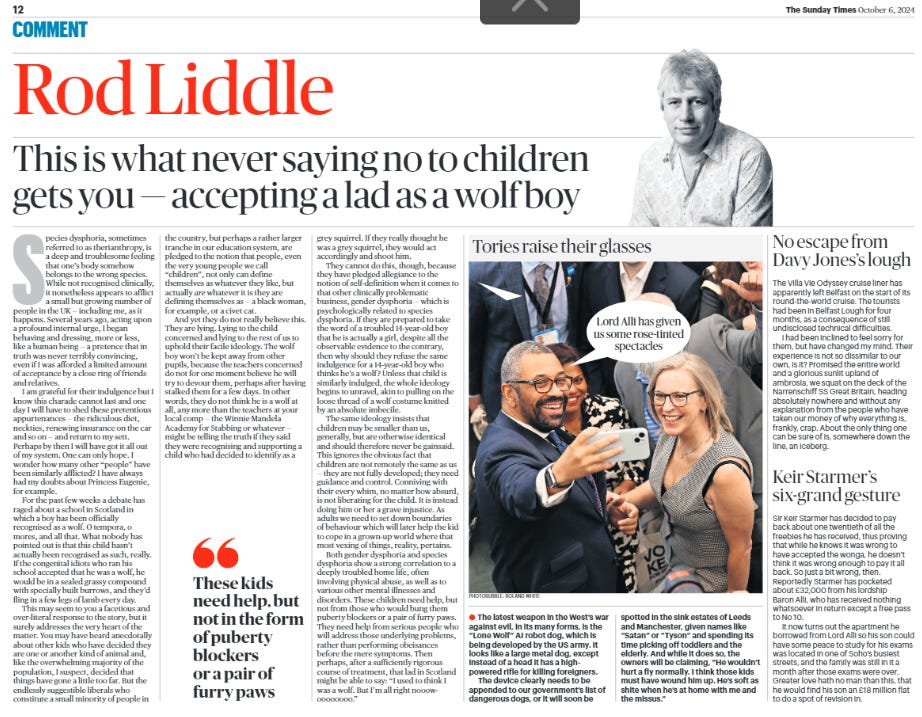
GB News allowed to challenge Ofcom ruling at full High Court hearing [Press Gazette]
- GB News has been granted permission to challenge Ofcom’s ruling that it breached impartiality rules during a Q&A programme with then-prime minister Rishi Sunak. The High Court judge, however, refused the channel’s request to temporarily block Ofcom from publishing its sanction, stating that Ofcom had already agreed not to publish any decision until after the case is fully heard. GB News argues that publishing a sanction before the legal challenge concludes would harm its reputation. Ofcom, meanwhile, contends the breach was serious and part of a pattern, with this being GB News’s 12th violation since 2022.
The case will proceed to a full hearing at a later date.
WHAT’S ON IN PARLIAMENT
Select business. Full House business can be viewed here.
Monday 7 October
- Parliament returns from recess
Tuesday 8 October
- House of Lords, afternoon, oral questions: Appointing an independent legal expert to review the seven allegations of child sex abuse against Sir Edward Heath left unresolved
Wednesday 9 October
- House of Commons, 12pm: Prime Minister’s Question Time
ANY OTHER BUSINESS
- Richard Dawkins, 83, who is known more these days for attacking trans people in the ‘defence’ of woman, is dating a woman 45 years his junior, as revealed in an article in Times 2 in which he called trans kids a ‘craze’.
![Is it a secret that your illustrator, 38, is your girlfriend? ‘Not a secret, no’ At 83, Richard Dawkins is at a point in his life when he has nothing to fear from bullies trying to intimidate him, he tells Andrew Billen. And after three marriages, the evolutionary biologist also has a new partner Dawkins and his girlfriend, the illustrator Jana Lenzova Next image › It will soon be 50 years since the evolutionary biologist Richard Dawkins published The Selfish Gene, in which he identified a sequence of DNA as the chief suspect in the whodunnit of life. It is already 18 years since his next-most famous book, The God Delusion, crucified life’s great red herring and gained such attention that Dawkins’s notoriety as God’s worst enemy threatened to eclipse his status as the gene’s best friend. The “new atheist” is now an old atheist. However, at 83, and having written only one subsequent book on God, he tends these days to discuss religion only when asked. His provocative tweets on the subject, and others such as the trans wars, are rarer too. “Isn’t it obvious?” he replies when I mention his declining activity on X. “I mean, it’s a lavatory wall, isn’t it?” His latest book, The Genetic Book of the Dead, offers fresh tales of the mighty gene. A stunning passage, for instance, explains one of nature’s best conjuring tricks. We all know that cuckoos opportunistically lay their eggs in all sorts of other birds’ nests, but how can the female cuckoo lay dark, speckled eggs that pass for meadow pipit eggs in a meadow pipit nest yet lay appropriately bluegreenish eggs in a reed warbler’s? This is surely the equivalent of a woman willing herself to have a red-haired child one year and blond the next. It is not, of course, God moving in mysterious ways. It’s genes again, here working alongside “cultural tradition”. Dawkins’s answer to the puzzle is that the specific female cuckoos that lay eggs in a meadow pipit’s nest are, like their mothers and grandmothers before them, genetically programmed by natural selection only to lay dark, speckled eggs — and, harbouring memories of their own nesthoods, they choose exclusively meadow pipit nests in which to lay eggs. Cuckoos with different backgrounds deposit their eggs in other nests — such as reed warblers’. It is a solution worthy of Sherlock Holmes, but also a feat of explanatory storytelling by Dawkins who, this afternoon, is in Newark, New Jersey, on what he insists is his last speaking tour. Is it paradoxical that someone so good at describing nature prefers to champion something transcribed as a sequence of numbers and letters, I ask. “It’s not paradoxical exactly,” he replies on Zoom from his hotel room. “These are just two aspects of the same thing. The cuckoo out there in the wild is the manifestation of the genes, and you can only understand the cuckoo if you go to the gene level.” But is that really true, I say, thinking that word “instinct” might do the heavy lifting for most of us. “Well, I think so, because you’ve got the really remarkable fact that different gentes [lineages] of female cuckoo mimic different species of foster parent — and that can only really be explained at a genetic level.” The Genetic Book of the Dead nature observations are embellished by exquisite pictures of cuckoos, tortoises and walruses by the illustrator Jana Lenzova. Born in Bratislava, Slovakia, Lenzova was commissioned to translate The God Delusion into Slovak and was soon contributing pictures to his books. She is also secretary of Richard Dawkins Ltd. I need to ask Dawkins more about this supertalented 38-year-old, but not, I think, so early in our interview. In saving something juicy for the end, I follow the example of the book, which, as Dawkins puts it, contains “a sting in the tail” — his declamation that the genes of our bodies’ bacteria, viruses and parasites are also carried by sperm and egg through the generations. “You are the incarnation,” he concludes, “the incarnation of a great seething, scrambling, timetravelling cooperative of viruses.” The idea, he thinks, will initially at least be controversial. It’s certainly a bit creepy. Perhaps it is what the computer game and HBO series The Last of Us was dramatising, with its deadly fungus taking over humans? “No, I don’t think so. I mean, that may be based on ants. There are wonderful funguses that take over ants. Perhaps that’s what that game is based on.” All he is saying, he clarifies, is that there’s no “particular reason” to distinguish between virus genes and their hosts’ genes. A matter of semantics? “Yes. It’s a bit of a poetic fancy.” So will this insight enter the textbooks or be a footnote to his career? “Probably more of a footnote. It’s part of the idea in [his 1982 book] The Extended Phenotype that genes survive by virtue of the effects they have on the world, not necessarily tied into a particular individual organism. I’m kind of downplaying the significance of the organism. It’s an aspect of that, I suppose.” In his insistent promotion of the importance of the gene over the organism (ie body), Dawkins has shown a consistency that outclasses his hero, Charles Darwin. Darwin, Dawkins points out, revised On the Origin of Species so greatly that the sixth edition was less accurate than the first. Over the years, Dawkins has altered only a few details in The Selfish Gene, and in his new book is still dishing out punishment to doubters who argue for the primacy of the organism. Among them is the Oxford biologist Denis Noble, now 87. “Noble is clear. He ringingly hits the nail on the head, but it’s the wrong nail,” Dawkins writes. Won’t his old doctoral examiner mind? “I think he’ll rather enjoy it. He has a sense of humour.” The new book’s title comes from Dawkins’s claim that our bodies and genomes form “a comprehensive dossier of a succession of colourful worlds long vanished, worlds that surrounded your ancestors long gone”. This sounds like a big idea, not just a further aspect of his “gene’s eye” view of history, but potentially a new take on pre-history for scientists to explore as genome sequencing develops. But Dawkins tempers my enthusiasm. “It’s probably optimistic to think it will tell us too much detail, actually. I suspect when you’re talking about homo sapiens leaving Africa, the archaeological evidence might be more full than the genetic palimpsest evidence. I think it’s rather more a kind of poetic vision of life.” Happily, the genetic future is still exciting. It seems that Jurassic Park is no longer science fiction. Dawkins believes the dodo, passenger pigeon, great auk and Tasmanian wolf may all be revived from extinction, and that there are “serious hopes” of a comeback by the woolly mammoth (by adding mammoth genes to elephant DNA). “Some people think it shouldn’t be done. I think it should be done. I think it would be very exciting to have herds of woolly mammoth roaming over the tundra,” he says. As you can tell, Dawkins, who has already twice used the word “poetic” in our conversation and quotes Shakespeare, Yeats and the King James Bible in his text, has a huge capacity for wonder (indeed, he told me three decades ago that natural history documentaries moved him to tears). His championing of the gene, however, rather robs us of the joys of anthropomorphism. Often this is a good thing. We really shouldn’t call the American cardinal bird “stupid” for dropping food into the mouth of a goldfish, for it is simply responding to the genes telling it to look for large, gawping, open mouths. Birds are not little humans, cognitively aware of what they are doing and why. “They are,” he reminds me, “little automata which are programmed by genomes to behave in certain ways which benefit the gene.” But Charles Foster, author of last year’s Cry of the Wild, would disagree. He believes animals are more like us than we think, for the simple reason that we are animals too. Chris Packham, the TV naturalist, is also sympathetic and told me a year ago that recognising animals as individuals was important in “generating affinity”. “I don’t deny the possibility of non-human animals having a consciousness, a self-consciousness, but you don’t need to assume that in order to study their behaviour; and [mine is] a kind of parsimony argument — that until we have good reason to depart from the view that they are automata, doing whatever’s best for their selfish genes, then we do that. But I don’t necessarily deny that they have feelings similar to ours.” Humans, of course, can disobey their genes, I say. Are any other animals as good as humans at ignoring theirs? “That’s a fascinating question. No, I don’t think so. I think humans have a rather unique ability. For example, contraception is clearly a dysgenic thing to do and we override it because we enjoy sex and we have, as it were, detached sex from its reproductive function.” As it happens, he thinks there may well be a “genetic contribution” to homosexuality in humans — “which does seem to be a bit of paradox” — but he is not buying the idea that there is similar genetic explanation for trans people identifying with the opposite gender. “It’s a meme. It’s a school craze. We all remember crazes for this toy or that toy and children tend to behave in a rather herdlike fashion, following fashion.” How many other academics enjoy his freedom to speak freely about these subjects? “Since I’m retired, I don’t have to fear for my career. I think there are people who genuinely do fear for their career because they fear being dumped on by mob rule.” Is he thinking of the philosopher Kathleen Stock, forced out of the University of Sussex for her views on transgenderism? “For example, yes. Hideously treated.” Assuming The Genetic Book of the Dead is his last book, I ask whether he has written and achieved all he wants to in life. He corrects me: this is not his last book. He is writing Tales from Haeckel based on the work of the “German Darwin” Ernst Haeckel, also an exquisite artist. Each chapter will expand on the animal portrayed in a Haeckel illustration. Dawkins confesses he cannot draw at all. So now I come to it. Dawkins has been married three times — first to the biologist Marian Stamp, then the late Eve Barham, by whom he has a daughter. His third marriage was to the Doctor Who actress Lalla Ward, who is credited with improving his public speaking. It ended amicably in 2016 and she is now married to the psychologist Nicholas Rawlins, and lives with him in Hong Kong where he is pro-vice-chancellor of a university. I ask Dawkins whether it is not time to acknowledge that Jana Lenzova is not just his illustrator but his partner. There is a long silence. “She is a wonderful illustrator.” Is she not his partner? “Yes.” I mean, it’s common knowledge in Oxford. Is it a secret? “It’s no great secret, no.” Well, she’s a fantastic artist. “She certainly is, yes.” I say I am delighted he has someone to share his adventures and he says, “Yes, yes,” but I am. As for the 45-year age difference, Dawkins neither looks, speaks nor writes like an old man. His mother, he points out, died at 102 and his father at 95. Although he had a minor stroke in 2016, he has good genes? “In that sense, maybe I have.” Certainly his genes have served him well. And, of course, the organism that is Richard Dawkins has served us all exceptionally well too. The Genetic Book of the Dead by Richard Dawkins is published on October 17 (Bloomsbury, £25). Buy from timesbookshop.co.uk or call 020 3176 2935. Free UK P&P on orders over £25. Special discount for Times+ members The rise of trans in schools? ‘It’s a craze. Children tend to behave in a rather herdlike fashion’ Is it a secret that your illustrator, 38, is your girlfriend? ‘Not a secret, no’ At 83, Richard Dawkins is at a point in his life when he has nothing to fear from bullies trying to intimidate him, he tells Andrew Billen. And after three marriages, the evolutionary biologist also has a new partner Dawkins and his girlfriend, the illustrator Jana Lenzova Next image › It will soon be 50 years since the evolutionary biologist Richard Dawkins published The Selfish Gene, in which he identified a sequence of DNA as the chief suspect in the whodunnit of life. It is already 18 years since his next-most famous book, The God Delusion, crucified life’s great red herring and gained such attention that Dawkins’s notoriety as God’s worst enemy threatened to eclipse his status as the gene’s best friend. The “new atheist” is now an old atheist. However, at 83, and having written only one subsequent book on God, he tends these days to discuss religion only when asked. His provocative tweets on the subject, and others such as the trans wars, are rarer too. “Isn’t it obvious?” he replies when I mention his declining activity on X. “I mean, it’s a lavatory wall, isn’t it?” His latest book, The Genetic Book of the Dead, offers fresh tales of the mighty gene. A stunning passage, for instance, explains one of nature’s best conjuring tricks. We all know that cuckoos opportunistically lay their eggs in all sorts of other birds’ nests, but how can the female cuckoo lay dark, speckled eggs that pass for meadow pipit eggs in a meadow pipit nest yet lay appropriately bluegreenish eggs in a reed warbler’s? This is surely the equivalent of a woman willing herself to have a red-haired child one year and blond the next. It is not, of course, God moving in mysterious ways. It’s genes again, here working alongside “cultural tradition”. Dawkins’s answer to the puzzle is that the specific female cuckoos that lay eggs in a meadow pipit’s nest are, like their mothers and grandmothers before them, genetically programmed by natural selection only to lay dark, speckled eggs — and, harbouring memories of their own nesthoods, they choose exclusively meadow pipit nests in which to lay eggs. Cuckoos with different backgrounds deposit their eggs in other nests — such as reed warblers’. It is a solution worthy of Sherlock Holmes, but also a feat of explanatory storytelling by Dawkins who, this afternoon, is in Newark, New Jersey, on what he insists is his last speaking tour. Is it paradoxical that someone so good at describing nature prefers to champion something transcribed as a sequence of numbers and letters, I ask. “It’s not paradoxical exactly,” he replies on Zoom from his hotel room. “These are just two aspects of the same thing. The cuckoo out there in the wild is the manifestation of the genes, and you can only understand the cuckoo if you go to the gene level.” But is that really true, I say, thinking that word “instinct” might do the heavy lifting for most of us. “Well, I think so, because you’ve got the really remarkable fact that different gentes [lineages] of female cuckoo mimic different species of foster parent — and that can only really be explained at a genetic level.” The Genetic Book of the Dead nature observations are embellished by exquisite pictures of cuckoos, tortoises and walruses by the illustrator Jana Lenzova. Born in Bratislava, Slovakia, Lenzova was commissioned to translate The God Delusion into Slovak and was soon contributing pictures to his books. She is also secretary of Richard Dawkins Ltd. I need to ask Dawkins more about this supertalented 38-year-old, but not, I think, so early in our interview. In saving something juicy for the end, I follow the example of the book, which, as Dawkins puts it, contains “a sting in the tail” — his declamation that the genes of our bodies’ bacteria, viruses and parasites are also carried by sperm and egg through the generations. “You are the incarnation,” he concludes, “the incarnation of a great seething, scrambling, timetravelling cooperative of viruses.” The idea, he thinks, will initially at least be controversial. It’s certainly a bit creepy. Perhaps it is what the computer game and HBO series The Last of Us was dramatising, with its deadly fungus taking over humans? “No, I don’t think so. I mean, that may be based on ants. There are wonderful funguses that take over ants. Perhaps that’s what that game is based on.” All he is saying, he clarifies, is that there’s no “particular reason” to distinguish between virus genes and their hosts’ genes. A matter of semantics? “Yes. It’s a bit of a poetic fancy.” So will this insight enter the textbooks or be a footnote to his career? “Probably more of a footnote. It’s part of the idea in [his 1982 book] The Extended Phenotype that genes survive by virtue of the effects they have on the world, not necessarily tied into a particular individual organism. I’m kind of downplaying the significance of the organism. It’s an aspect of that, I suppose.” In his insistent promotion of the importance of the gene over the organism (ie body), Dawkins has shown a consistency that outclasses his hero, Charles Darwin. Darwin, Dawkins points out, revised On the Origin of Species so greatly that the sixth edition was less accurate than the first. Over the years, Dawkins has altered only a few details in The Selfish Gene, and in his new book is still dishing out punishment to doubters who argue for the primacy of the organism. Among them is the Oxford biologist Denis Noble, now 87. “Noble is clear. He ringingly hits the nail on the head, but it’s the wrong nail,” Dawkins writes. Won’t his old doctoral examiner mind? “I think he’ll rather enjoy it. He has a sense of humour.” The new book’s title comes from Dawkins’s claim that our bodies and genomes form “a comprehensive dossier of a succession of colourful worlds long vanished, worlds that surrounded your ancestors long gone”. This sounds like a big idea, not just a further aspect of his “gene’s eye” view of history, but potentially a new take on pre-history for scientists to explore as genome sequencing develops. But Dawkins tempers my enthusiasm. “It’s probably optimistic to think it will tell us too much detail, actually. I suspect when you’re talking about homo sapiens leaving Africa, the archaeological evidence might be more full than the genetic palimpsest evidence. I think it’s rather more a kind of poetic vision of life.” Happily, the genetic future is still exciting. It seems that Jurassic Park is no longer science fiction. Dawkins believes the dodo, passenger pigeon, great auk and Tasmanian wolf may all be revived from extinction, and that there are “serious hopes” of a comeback by the woolly mammoth (by adding mammoth genes to elephant DNA). “Some people think it shouldn’t be done. I think it should be done. I think it would be very exciting to have herds of woolly mammoth roaming over the tundra,” he says. As you can tell, Dawkins, who has already twice used the word “poetic” in our conversation and quotes Shakespeare, Yeats and the King James Bible in his text, has a huge capacity for wonder (indeed, he told me three decades ago that natural history documentaries moved him to tears). His championing of the gene, however, rather robs us of the joys of anthropomorphism. Often this is a good thing. We really shouldn’t call the American cardinal bird “stupid” for dropping food into the mouth of a goldfish, for it is simply responding to the genes telling it to look for large, gawping, open mouths. Birds are not little humans, cognitively aware of what they are doing and why. “They are,” he reminds me, “little automata which are programmed by genomes to behave in certain ways which benefit the gene.” But Charles Foster, author of last year’s Cry of the Wild, would disagree. He believes animals are more like us than we think, for the simple reason that we are animals too. Chris Packham, the TV naturalist, is also sympathetic and told me a year ago that recognising animals as individuals was important in “generating affinity”. “I don’t deny the possibility of non-human animals having a consciousness, a self-consciousness, but you don’t need to assume that in order to study their behaviour; and [mine is] a kind of parsimony argument — that until we have good reason to depart from the view that they are automata, doing whatever’s best for their selfish genes, then we do that. But I don’t necessarily deny that they have feelings similar to ours.” Humans, of course, can disobey their genes, I say. Are any other animals as good as humans at ignoring theirs? “That’s a fascinating question. No, I don’t think so. I think humans have a rather unique ability. For example, contraception is clearly a dysgenic thing to do and we override it because we enjoy sex and we have, as it were, detached sex from its reproductive function.” As it happens, he thinks there may well be a “genetic contribution” to homosexuality in humans — “which does seem to be a bit of paradox” — but he is not buying the idea that there is similar genetic explanation for trans people identifying with the opposite gender. “It’s a meme. It’s a school craze. We all remember crazes for this toy or that toy and children tend to behave in a rather herdlike fashion, following fashion.” How many other academics enjoy his freedom to speak freely about these subjects? “Since I’m retired, I don’t have to fear for my career. I think there are people who genuinely do fear for their career because they fear being dumped on by mob rule.” Is he thinking of the philosopher Kathleen Stock, forced out of the University of Sussex for her views on transgenderism? “For example, yes. Hideously treated.” Assuming The Genetic Book of the Dead is his last book, I ask whether he has written and achieved all he wants to in life. He corrects me: this is not his last book. He is writing Tales from Haeckel based on the work of the “German Darwin” Ernst Haeckel, also an exquisite artist. Each chapter will expand on the animal portrayed in a Haeckel illustration. Dawkins confesses he cannot draw at all. So now I come to it. Dawkins has been married three times — first to the biologist Marian Stamp, then the late Eve Barham, by whom he has a daughter. His third marriage was to the Doctor Who actress Lalla Ward, who is credited with improving his public speaking. It ended amicably in 2016 and she is now married to the psychologist Nicholas Rawlins, and lives with him in Hong Kong where he is pro-vice-chancellor of a university. I ask Dawkins whether it is not time to acknowledge that Jana Lenzova is not just his illustrator but his partner. There is a long silence. “She is a wonderful illustrator.” Is she not his partner? “Yes.” I mean, it’s common knowledge in Oxford. Is it a secret? “It’s no great secret, no.” Well, she’s a fantastic artist. “She certainly is, yes.” I say I am delighted he has someone to share his adventures and he says, “Yes, yes,” but I am. As for the 45-year age difference, Dawkins neither looks, speaks nor writes like an old man. His mother, he points out, died at 102 and his father at 95. Although he had a minor stroke in 2016, he has good genes? “In that sense, maybe I have.” Certainly his genes have served him well. And, of course, the organism that is Richard Dawkins has served us all exceptionally well too. The Genetic Book of the Dead by Richard Dawkins is published on October 17 (Bloomsbury, £25). Buy from timesbookshop.co.uk or call 020 3176 2935. Free UK P&P on orders over £25. Special discount for Times+ members The rise of trans in schools? ‘It’s a craze. Children tend to behave in a rather herdlike fashion’](https://substackcdn.com/image/fetch/w_1456,c_limit,f_auto,q_auto:good,fl_progressive:steep/https%3A%2F%2Fsubstack-post-media.s3.amazonaws.com%2Fpublic%2Fimages%2Fefd889c2-bd31-4eb7-8967-2f56004426f3_1361x846.png)
- Ron DeSantis has backed Kemi Badenoch for Tory leader
- Judgment in Andrew and Tristan Tate tax evasion case is due on Monday 7 October
- Friday, 11 October is National Coming Out Day
- Saturday, 12 October, as well as being my birthday, is also the start of National Hate Crime Awareness Week (to October 17)
THE PAPERS
Right, let’s get to this week’s papers.
After a quiet week last week with only eight articles published, the papers – in particular the Telegraph – picked things back up again. They alone published 10, still someway short of their most prolific weeks, but an uptick nonetheless.
After a short period where the Telegraph also seemed to be moving their anti-trans content into their supplements, it is now firmly back within the main paper.
This week, the papers covered Miriam Cates calling for children to be kept ignorant and ripe for abusers, and the Met refusing to issue gender neutral uniforms because they cause thrush and squashed testicles. Quite how non-binary people manage to find clothing that doesn’t cause disease and destruction seems to be yet another mystery that the police can’t solve. The Telegraph also treated us to three pages on some GC nurses who absolutely, positively aren’t transphobic. They just want to exclude and humiliate their trans colleague for reasons.
Beyond that, it was a mix of the papers’ usual nonsense, all of which you can see below.
The Guardian remained trans free all week while the Times had three pieces, the Mail two and the Telegraph, as mentioned, 10.
Sunday was the only day with no content about trans people.
THE PAPERS Monday 30th September – Sunday 6th October
Monday Total: 6
The Guardian [0]
The Times [1]
![Rowling defends Duffield against the ‘numbskulls’ Geraldine Scott - Senior Political Correspondent Rosie Duffield quit Labour and said: “The sleaze [is] off the scale” JK Rowling backed the former Labour MP Rosie Duffield against “selfsatisfied numbskulls” in the party who did not “stand up for women and girls”. Duffield will sit as an independent for Canterbury after telling Sir Keir Starmer that he was implementing “cruel and unnecessary” policies, such as the twochild benefit cap, and criticised the gifts and hospitality the Labour leader and other senior figures had received. In her resignation letter, revealed by The Sunday Times, Duffield, 53, said: “The sleaze, nepotism and apparent avarice are off the scale. I am so ashamed of what you and your inner circle have done to tarnish and humiliate our once-proud party.” Some said she should have been ejected “long ago” amid rifts with Starmer over the rights of women and transgender people. Nadia Whittome, the left-wing Nottingham East MP, said: “No matter your views on her stated reasons for quitting, Rosie Duffield has made a political career out of dehumanising one of the most marginalised groups in society. She should never have been allowed the privilege of resigning.” Rowling, the author and women’s rights campaigner, jumped to her friend’s defence. Replying to Whittome on X, she said: “Rosie Duffield was one of the few female Labour politicians with the guts to stand up for vulnerable women and girls, while self-satisfied numbskulls like you fought to give away their rights and spaces. Keep her name out of your mouth.” Duffield replied: “Stay classy Nadia.” The MP admitted yesterday that she had been considering her place within the party for “years” and that it was “no secret I’ve had my problems with the leadership” over women’s and transgender rights. She told LBC that she did not like the “shift to the right” under Starmer and had had “very little support” within the party. She also said Starmer had a problem with women and was surrounded by “lads” — a claim that the party denied. Duffield said: “Most backbenchers I’m friends with are women and most of us refer to the men that surround him, the young men, as ‘the lads’ and it’s very clear that the lads are in charge. They have got their Downing Street passes. They are the same lads who were briefing against me in the papers and other prominent female MPs and I was really hoping for better — but it wasn’t to be.” Duffield has faced calls to seek a by-election after winning under Labour’s banner on July 4. Abdi Duale, of Labour’s National Executive Committee, said it was “funny how people find their principles after winning five more years in parliament”. Duffield told LBC she had “always put my constituency first”. When asked if she would call a by-election she said: “No, I think the reason that you do that is usually if you break the law and sort of transgress in some way.” She said on X: “Like all the people who voted Labour three months ago, I expected and hoped for better. I have made clear that I resigned because of what the party has done since being in government.” Pat McFadden, the Cabinet Office minister, said Duffield’s resignation was not a surprise. He told the BBC’s Sunday with Laura Kuenssberg: “When I read Rosie’s letter last night, I think you can see she has been disillusioned with the party leader, maybe the party more generally, for quite a long time. I don’t think this is something that just developed in the last few months.” Duffield was praised for her decision by Tory leadership candidates. Kemi Badenoch told Times Radio that she was the Labour person she liked most. But, asked if Duffield would be welcome in the Tory party, she said: “She fights for her beliefs. She’s passionate, principled, but not a Conservative.” Rowling defends Duffield against the ‘numbskulls’ Geraldine Scott - Senior Political Correspondent Rosie Duffield quit Labour and said: “The sleaze [is] off the scale” JK Rowling backed the former Labour MP Rosie Duffield against “selfsatisfied numbskulls” in the party who did not “stand up for women and girls”. Duffield will sit as an independent for Canterbury after telling Sir Keir Starmer that he was implementing “cruel and unnecessary” policies, such as the twochild benefit cap, and criticised the gifts and hospitality the Labour leader and other senior figures had received. In her resignation letter, revealed by The Sunday Times, Duffield, 53, said: “The sleaze, nepotism and apparent avarice are off the scale. I am so ashamed of what you and your inner circle have done to tarnish and humiliate our once-proud party.” Some said she should have been ejected “long ago” amid rifts with Starmer over the rights of women and transgender people. Nadia Whittome, the left-wing Nottingham East MP, said: “No matter your views on her stated reasons for quitting, Rosie Duffield has made a political career out of dehumanising one of the most marginalised groups in society. She should never have been allowed the privilege of resigning.” Rowling, the author and women’s rights campaigner, jumped to her friend’s defence. Replying to Whittome on X, she said: “Rosie Duffield was one of the few female Labour politicians with the guts to stand up for vulnerable women and girls, while self-satisfied numbskulls like you fought to give away their rights and spaces. Keep her name out of your mouth.” Duffield replied: “Stay classy Nadia.” The MP admitted yesterday that she had been considering her place within the party for “years” and that it was “no secret I’ve had my problems with the leadership” over women’s and transgender rights. She told LBC that she did not like the “shift to the right” under Starmer and had had “very little support” within the party. She also said Starmer had a problem with women and was surrounded by “lads” — a claim that the party denied. Duffield said: “Most backbenchers I’m friends with are women and most of us refer to the men that surround him, the young men, as ‘the lads’ and it’s very clear that the lads are in charge. They have got their Downing Street passes. They are the same lads who were briefing against me in the papers and other prominent female MPs and I was really hoping for better — but it wasn’t to be.” Duffield has faced calls to seek a by-election after winning under Labour’s banner on July 4. Abdi Duale, of Labour’s National Executive Committee, said it was “funny how people find their principles after winning five more years in parliament”. Duffield told LBC she had “always put my constituency first”. When asked if she would call a by-election she said: “No, I think the reason that you do that is usually if you break the law and sort of transgress in some way.” She said on X: “Like all the people who voted Labour three months ago, I expected and hoped for better. I have made clear that I resigned because of what the party has done since being in government.” Pat McFadden, the Cabinet Office minister, said Duffield’s resignation was not a surprise. He told the BBC’s Sunday with Laura Kuenssberg: “When I read Rosie’s letter last night, I think you can see she has been disillusioned with the party leader, maybe the party more generally, for quite a long time. I don’t think this is something that just developed in the last few months.” Duffield was praised for her decision by Tory leadership candidates. Kemi Badenoch told Times Radio that she was the Labour person she liked most. But, asked if Duffield would be welcome in the Tory party, she said: “She fights for her beliefs. She’s passionate, principled, but not a Conservative.”](https://substackcdn.com/image/fetch/w_1456,c_limit,f_auto,q_auto:good,fl_progressive:steep/https%3A%2F%2Fsubstack-post-media.s3.amazonaws.com%2Fpublic%2Fimages%2F2fae60b4-78d1-4a51-be57-9367e051d209_325x694.png)
Daily Mail [1]

Telegraph [4]
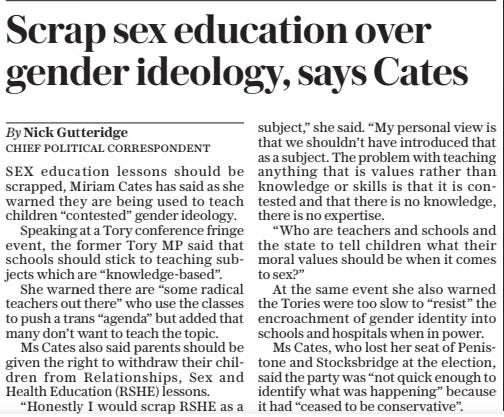
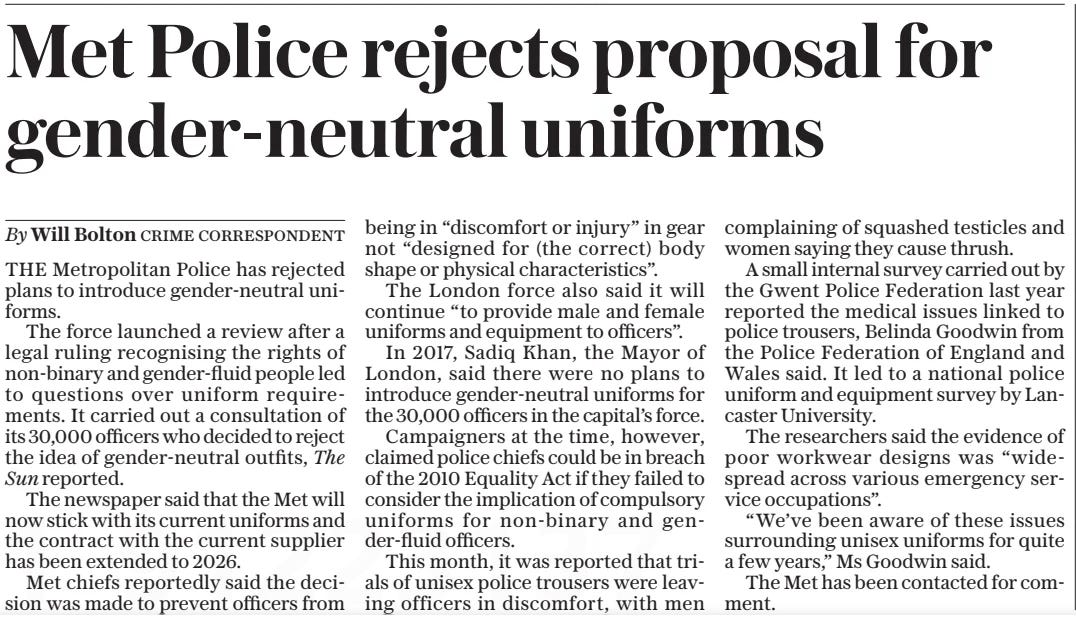
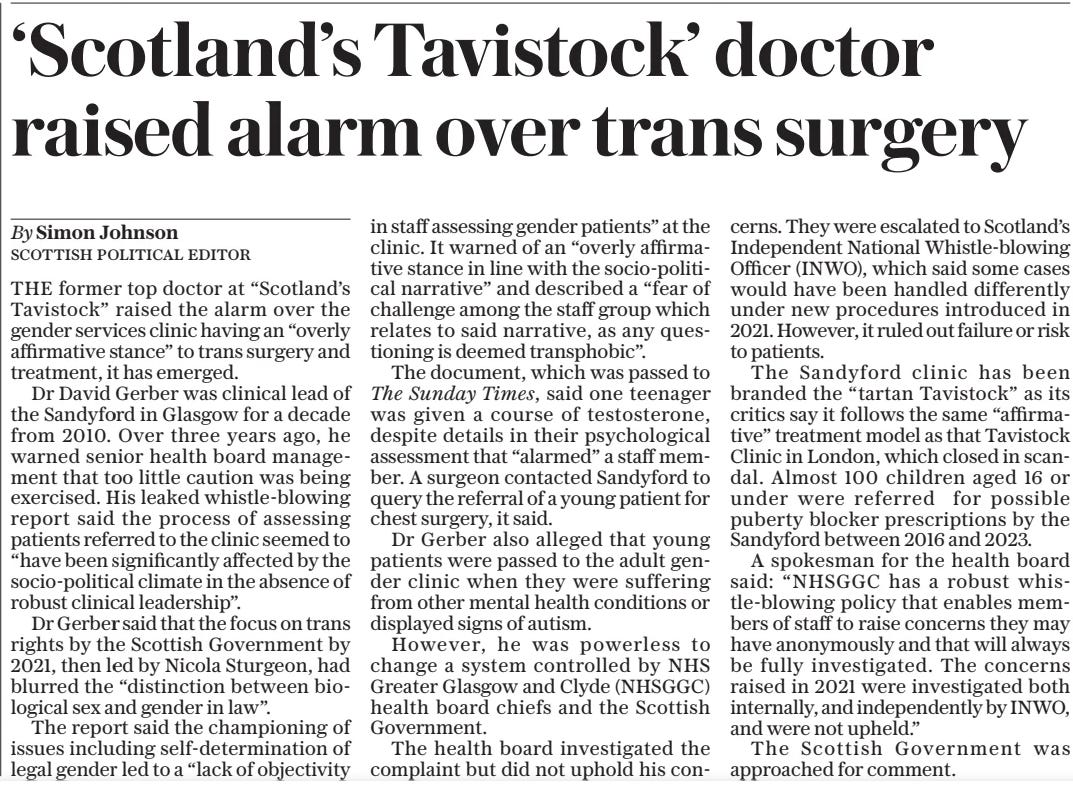
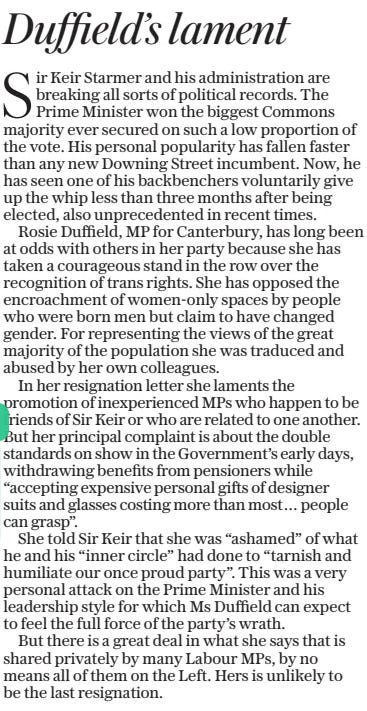
Tuesday Total: 1
The Guardian [0]
The Times [0]
Daily Mail [0]
Telegraph [1]

Wednesday Total: 1
The Guardian [0]
The Times [0]
Daily Mail [1]
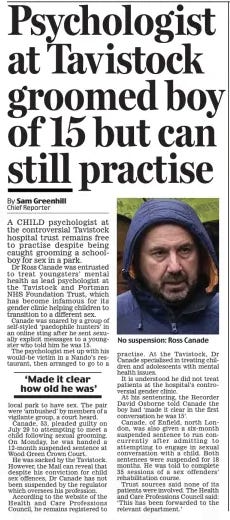
Telegraph [0]
Thursday Total: 1
The Guardian [0]
The Times [0]
Daily Mail [0]
Telegraph [1]
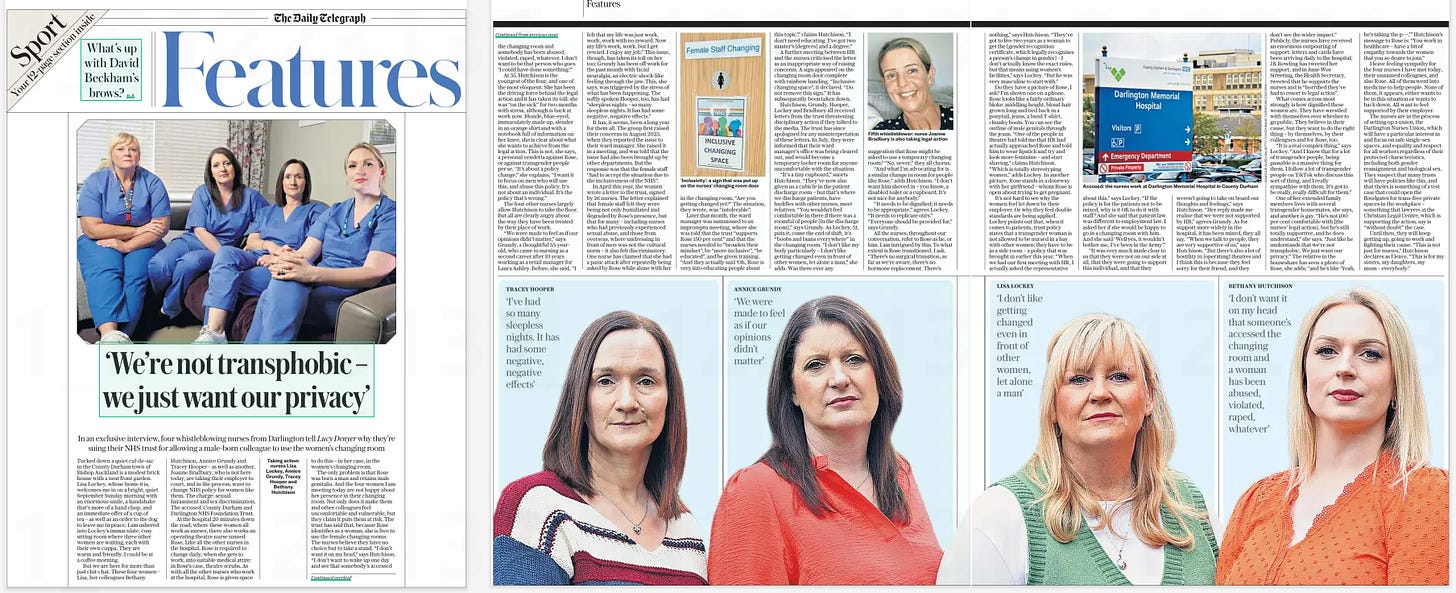
Friday Total: 3
The Guardian [0]
The Times [1]

Daily Mail [0]
Telegraph [2]

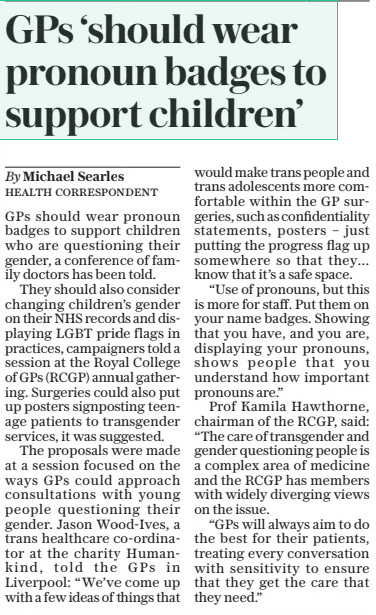
Saturday Total: 3
The Guardian [0]
The Times [1]
![What is a woman? ‘I believe in clarity and I try to keep the law up to date’ As the Supreme Court prepares to rule on one of the most contentious of questions, Lord Reed, its president, discusses its approach with Frances Gibb Lord Reed in Court 1. Behind him is a portrait of Sir Montagu Sharpe, a chairman of the Middlesex quarter sessions, which once settled criminal cases and administrative matters What is a woman? This issue, now highly controversial, will be decided next month by the highest court in the land. Five senior judges will sit in the quiet, restrained atmosphere of Court One in the Supreme Court in Parliament Square, impervious to the placards and banners of any protesters outside. The justices — three men and two women — will be led by Lord Reed of Allermuir, 68, president of the court and the UK’s most senior judge. He is undaunted by the task. “When we hear cases … we are not trying to decide what social policy ought to be. That’s not our function. What we are trying to do, generally and in this particular case, is to interpret a particular statute or provision.” This particular statute is a law aimed at improving the gender balance of public boards in line with the Equality Act. Does that, however, include transwomen with a genderrecognition certificate? The appeal is being brought by a Scottish campaign group, For Women Scotland, after Scotland’s highest court ruled in favour of a wider definition. Campaigners for women’s “sexbased rights” have said it is “game on” in their fight to protect those rights within the legal system; transwomen say they would lose rights to equal pay with men and suffer restricted services. The justices will declare how the present law is to be interpreted, pending any change the government may wish to make. Reed, mild-mannered and softly spoken, is like an academic approaching a knotty argument. “I’m a great believer in clarity. And, where the law is in a muddle, I like to sort it out. And I see quite a lot of muddles,” he says, adding: “I don’t get too emotionally involved. It’s quite easy at this level because we’re dealing with intellectual problems. And I try, I think it’s very important, to keep the law up to date so that it fits the needs of society as it develops.” As the UK’s top appeal court, the Supreme Court is the final arbiter on what our laws mean. It ruled last year that the previous government’s Rwanda scheme was unlawful. It has also ruled that Boris Johnson, when prime minister, acted unlawfully in suspending parliament and that Brexit could not be triggered without parliament’s approval. Reed, who took charge in 2020, has to tread carefully in other political minefields. One is the controversy over UK judges sitting in Hong Kong’s final court of appeal, not least after its ruling against the democracy campaigner Jimmy Lai. In 2022 Reed withdrew from sitting there and the retired justices Lord Sumption and Lord Collins of Mapesbury followed suit in June. Last Monday another former justice, Lord Phillips of Worth Matravers, stepped down. Reed took his decision, he says, “because of the loss of political freedom and freedom of speech there”. The two retired judges who still sit [Lords Neuberger of Abbotsbury and Hoffmann] “are private citizens, and have to make their own judgment. It is not for me to criticise them.” Then there is the European Court of Human Rights. Robert Jenrick, a contender for Conservative Party leader, wants Britain to pull out from the court. Reed is circumspect: it is a matter for politicians. However, he cites the potential damage of withdrawal, such as to extradition arrangements or the Good Friday agreement. Membership is “good for our reputation internationally, as a country where rights are respected”, he says. “And that’s part of the reason why there’s international investment in the UK.” He is concerned about pre-empting tensions between judges and politicians. He has embarked on an unprecedented public relations drive with the court’s chief executive, Vicky Fox, sending an “explainer” video introduced by Sir Lindsay Hoyle, the Speaker, to all 355 new MPs. It covers the rule of law and the constitutional role of the court and is part of their parliamentary induction pack. The aim is to dispel any mistrust — the notion that judges are interfering with government policy — and to avoid “enemies of the people”-type headlines. But he insists: “I don’t see these things as the court versus parliament. I see the court upholding parliament by enforcing legislation. Sometimes we have to rule that the government has acted unlawfully. I’ve made the point of explaining to MPs that the government and parliament are not the same thing. “And, for the court to have to say sometimes that the government (of whatever complexion) has overstepped the mark, is perfectly normal.” The first Scot to chair the court, Reed describes himself as cautious and conservative as a judge. He was in the minority on the ruling that parliament’s approval was needed before the Brexit process was triggered: Reed was one of three justices, out of 11, who decided that it was not. Was he wrong? He pauses for several seconds. “I think my reasoning is more compelling than the majority reasoning,” but he adds: “If I were redoing it, I think there’s a lot to be said for the other point of view. I’m not sure if I was right.” He grew up in Edinburgh, the eldest of four children, raised by his mother and his civil servant father, and attended George Watson’s College. As a boy, he was bored and rather badly behaved; he was very short-sighted and it was not picked up until he was about eight. “Then I got glasses and that made all the difference. I started doing well.” He was drawn to law after sitting as a sixth-former in some university law lectures. “I found law interesting and thought: this is a grown-up subject. Then when I did it at university, I found I was quite good at it.” Reed is speaking in his first newspaper interview as the court celebrates 15 years. The House of Lords committee that preceded it sat tucked away in an obscure corridor of the Palace of Westminster. Few people were aware of it. Tony Blair’s constitutional reforms in 2005 created a separate Supreme Court, set up in 2009 in its own building, marking its constitutional, as well as physical, independence. The original refurbishment was expensive but impressive. The specially designed carpets, glass and stone interior are a world away from the often dirty, leaking and shabby crown courts up and down the country. So, it is something of a flagship. “Members of the public are now starting to see some of the consequences of constraints on public spending, for example with the early release of prisoners because of a lack of capacity in the prison system. Judges,” he adds carefully, “will continue to argue the case for more resources to be devoted to the justice system.” But the decision is “rightly” for democratically elected politicians — and there are other calls on the public purse. Tourists are amazed that they can come in and watch cases, Reed says. The justices sit without wigs or gowns at a curved table in a semi-circle — with counsel and solicitors opposite. Their elaborate gold-braided robes are only for formal occasions. Reed attracted the admiration of the actress Dame Joanna Lumley when they attended the coronation and exchanged words, to his delight, he confesses with a smile. His verdict on the past 15 years? “A tremendous success.” The biggest single achievement has been “making what was previously an invisible court visible and transparent and accessible”. It was the first court with cameras to live-stream proceedings worldwide; even the United States Supreme Court is not filmed. This autumn Reed embarks on a UK-wide promotional drive, chairing public discussion panels in Glasgow, Cardiff, Belfast and London. Since becoming a justice in 2012 he has been instrumental in key rulings, and is noted for developing the common law and access to justice. He is most proud of a case in 2015 that established that patients should be informed of all the facts before a medical procedure, so they can give proper consent. He controversially ruled that higher fees imposed on employees bringing tribunal claims were a denial of access to justice: it was widely welcomed but critics said he had overstepped the judicial mark into policy-making. He also led the court in ruling that “safeaccess zones” around abortion clinics in Northern Ireland did not violate protesters’ rights. The zones will be enforced at clinics from October 31. In his quiet way, Reed seems something of a feminist. He is proud that, under him, half of the four new appointments to the 12-strong court have been women. He has invited a large number of judges from the Court of Appeal to sit with the justices on cases and is keen especially to see women and ethnic minority judges do so. “The idea is that they get to know the set-up, see what a friendly place it is, how nice my colleagues are. Hopefully, they will think about applying. It’s important,” he adds, “that we’re not regarded as some sort of ivory tower.” Justices hold regular online sessions with school pupils; and internships are offered, especially for disadvantaged young or mid-career lawyers. Reed talks animatedly of attracting women and those from ethnic minorities into judicial careers. “In time this is going to have an effect.” When people think of the justice system, they often think of the criminal law, he says. “When you go into our courtroom, you don’t see a jury box or witness box but the rulings affect people at every level of their lives. People tend not to realise the extent to which the law underpins their ordinary everyday lives.” As for what a woman is, there can be few issues underpinning life more than that. What is a woman? ‘I believe in clarity and I try to keep the law up to date’ As the Supreme Court prepares to rule on one of the most contentious of questions, Lord Reed, its president, discusses its approach with Frances Gibb Lord Reed in Court 1. Behind him is a portrait of Sir Montagu Sharpe, a chairman of the Middlesex quarter sessions, which once settled criminal cases and administrative matters What is a woman? This issue, now highly controversial, will be decided next month by the highest court in the land. Five senior judges will sit in the quiet, restrained atmosphere of Court One in the Supreme Court in Parliament Square, impervious to the placards and banners of any protesters outside. The justices — three men and two women — will be led by Lord Reed of Allermuir, 68, president of the court and the UK’s most senior judge. He is undaunted by the task. “When we hear cases … we are not trying to decide what social policy ought to be. That’s not our function. What we are trying to do, generally and in this particular case, is to interpret a particular statute or provision.” This particular statute is a law aimed at improving the gender balance of public boards in line with the Equality Act. Does that, however, include transwomen with a genderrecognition certificate? The appeal is being brought by a Scottish campaign group, For Women Scotland, after Scotland’s highest court ruled in favour of a wider definition. Campaigners for women’s “sexbased rights” have said it is “game on” in their fight to protect those rights within the legal system; transwomen say they would lose rights to equal pay with men and suffer restricted services. The justices will declare how the present law is to be interpreted, pending any change the government may wish to make. Reed, mild-mannered and softly spoken, is like an academic approaching a knotty argument. “I’m a great believer in clarity. And, where the law is in a muddle, I like to sort it out. And I see quite a lot of muddles,” he says, adding: “I don’t get too emotionally involved. It’s quite easy at this level because we’re dealing with intellectual problems. And I try, I think it’s very important, to keep the law up to date so that it fits the needs of society as it develops.” As the UK’s top appeal court, the Supreme Court is the final arbiter on what our laws mean. It ruled last year that the previous government’s Rwanda scheme was unlawful. It has also ruled that Boris Johnson, when prime minister, acted unlawfully in suspending parliament and that Brexit could not be triggered without parliament’s approval. Reed, who took charge in 2020, has to tread carefully in other political minefields. One is the controversy over UK judges sitting in Hong Kong’s final court of appeal, not least after its ruling against the democracy campaigner Jimmy Lai. In 2022 Reed withdrew from sitting there and the retired justices Lord Sumption and Lord Collins of Mapesbury followed suit in June. Last Monday another former justice, Lord Phillips of Worth Matravers, stepped down. Reed took his decision, he says, “because of the loss of political freedom and freedom of speech there”. The two retired judges who still sit [Lords Neuberger of Abbotsbury and Hoffmann] “are private citizens, and have to make their own judgment. It is not for me to criticise them.” Then there is the European Court of Human Rights. Robert Jenrick, a contender for Conservative Party leader, wants Britain to pull out from the court. Reed is circumspect: it is a matter for politicians. However, he cites the potential damage of withdrawal, such as to extradition arrangements or the Good Friday agreement. Membership is “good for our reputation internationally, as a country where rights are respected”, he says. “And that’s part of the reason why there’s international investment in the UK.” He is concerned about pre-empting tensions between judges and politicians. He has embarked on an unprecedented public relations drive with the court’s chief executive, Vicky Fox, sending an “explainer” video introduced by Sir Lindsay Hoyle, the Speaker, to all 355 new MPs. It covers the rule of law and the constitutional role of the court and is part of their parliamentary induction pack. The aim is to dispel any mistrust — the notion that judges are interfering with government policy — and to avoid “enemies of the people”-type headlines. But he insists: “I don’t see these things as the court versus parliament. I see the court upholding parliament by enforcing legislation. Sometimes we have to rule that the government has acted unlawfully. I’ve made the point of explaining to MPs that the government and parliament are not the same thing. “And, for the court to have to say sometimes that the government (of whatever complexion) has overstepped the mark, is perfectly normal.” The first Scot to chair the court, Reed describes himself as cautious and conservative as a judge. He was in the minority on the ruling that parliament’s approval was needed before the Brexit process was triggered: Reed was one of three justices, out of 11, who decided that it was not. Was he wrong? He pauses for several seconds. “I think my reasoning is more compelling than the majority reasoning,” but he adds: “If I were redoing it, I think there’s a lot to be said for the other point of view. I’m not sure if I was right.” He grew up in Edinburgh, the eldest of four children, raised by his mother and his civil servant father, and attended George Watson’s College. As a boy, he was bored and rather badly behaved; he was very short-sighted and it was not picked up until he was about eight. “Then I got glasses and that made all the difference. I started doing well.” He was drawn to law after sitting as a sixth-former in some university law lectures. “I found law interesting and thought: this is a grown-up subject. Then when I did it at university, I found I was quite good at it.” Reed is speaking in his first newspaper interview as the court celebrates 15 years. The House of Lords committee that preceded it sat tucked away in an obscure corridor of the Palace of Westminster. Few people were aware of it. Tony Blair’s constitutional reforms in 2005 created a separate Supreme Court, set up in 2009 in its own building, marking its constitutional, as well as physical, independence. The original refurbishment was expensive but impressive. The specially designed carpets, glass and stone interior are a world away from the often dirty, leaking and shabby crown courts up and down the country. So, it is something of a flagship. “Members of the public are now starting to see some of the consequences of constraints on public spending, for example with the early release of prisoners because of a lack of capacity in the prison system. Judges,” he adds carefully, “will continue to argue the case for more resources to be devoted to the justice system.” But the decision is “rightly” for democratically elected politicians — and there are other calls on the public purse. Tourists are amazed that they can come in and watch cases, Reed says. The justices sit without wigs or gowns at a curved table in a semi-circle — with counsel and solicitors opposite. Their elaborate gold-braided robes are only for formal occasions. Reed attracted the admiration of the actress Dame Joanna Lumley when they attended the coronation and exchanged words, to his delight, he confesses with a smile. His verdict on the past 15 years? “A tremendous success.” The biggest single achievement has been “making what was previously an invisible court visible and transparent and accessible”. It was the first court with cameras to live-stream proceedings worldwide; even the United States Supreme Court is not filmed. This autumn Reed embarks on a UK-wide promotional drive, chairing public discussion panels in Glasgow, Cardiff, Belfast and London. Since becoming a justice in 2012 he has been instrumental in key rulings, and is noted for developing the common law and access to justice. He is most proud of a case in 2015 that established that patients should be informed of all the facts before a medical procedure, so they can give proper consent. He controversially ruled that higher fees imposed on employees bringing tribunal claims were a denial of access to justice: it was widely welcomed but critics said he had overstepped the judicial mark into policy-making. He also led the court in ruling that “safeaccess zones” around abortion clinics in Northern Ireland did not violate protesters’ rights. The zones will be enforced at clinics from October 31. In his quiet way, Reed seems something of a feminist. He is proud that, under him, half of the four new appointments to the 12-strong court have been women. He has invited a large number of judges from the Court of Appeal to sit with the justices on cases and is keen especially to see women and ethnic minority judges do so. “The idea is that they get to know the set-up, see what a friendly place it is, how nice my colleagues are. Hopefully, they will think about applying. It’s important,” he adds, “that we’re not regarded as some sort of ivory tower.” Justices hold regular online sessions with school pupils; and internships are offered, especially for disadvantaged young or mid-career lawyers. Reed talks animatedly of attracting women and those from ethnic minorities into judicial careers. “In time this is going to have an effect.” When people think of the justice system, they often think of the criminal law, he says. “When you go into our courtroom, you don’t see a jury box or witness box but the rulings affect people at every level of their lives. People tend not to realise the extent to which the law underpins their ordinary everyday lives.” As for what a woman is, there can be few issues underpinning life more than that.](https://substackcdn.com/image/fetch/w_1456,c_limit,f_auto,q_auto:good,fl_progressive:steep/https%3A%2F%2Fsubstack-post-media.s3.amazonaws.com%2Fpublic%2Fimages%2Fb267f50d-b98c-49cb-91f3-15a2154af46f_1349x847.png)
Daily Mail [0]
Telegraph [2]
![Literature festival in gender warning row The Daily Telegraph - Saturday5 Oct 2024 Cheltenham Literature Festival has come under fire after a warning to speakers comparing gender-critical views to racism and homophobia. The festival, which began yesterday, sent an email to those hosting talks, asking them to follow new guidance “in order to protect both yourselves and the [festival] from complaints”. Helen Joyce, of human rights charity Sex Matters, said: “Heaven forbid that a book festival should allow mention of biological reality without immediately distancing itself. It is of course outrageous to compare gender-critical views to racism or conspiracy theories. The festival organisers should be pressed to explain.” Literature festival in gender warning row The Daily Telegraph - Saturday5 Oct 2024 Cheltenham Literature Festival has come under fire after a warning to speakers comparing gender-critical views to racism and homophobia. The festival, which began yesterday, sent an email to those hosting talks, asking them to follow new guidance “in order to protect both yourselves and the [festival] from complaints”. Helen Joyce, of human rights charity Sex Matters, said: “Heaven forbid that a book festival should allow mention of biological reality without immediately distancing itself. It is of course outrageous to compare gender-critical views to racism or conspiracy theories. The festival organisers should be pressed to explain.”](https://substackcdn.com/image/fetch/w_1456,c_limit,f_auto,q_auto:good,fl_progressive:steep/https%3A%2F%2Fsubstack-post-media.s3.amazonaws.com%2Fpublic%2Fimages%2F81f76179-a4b8-48ba-b832-a5a216dc3b43_302x398.png)

Sunday Total: 0
TRANSWRITES YOU MIGHT HAVE MISSED
- Mridul Wadhwa quits Edinburgh Rape Crisis Centre after sustained anti-trans campaign against her, by Gemma Stone
- “Transitions The Unheard Stories” review; A useful resource hampered by an inconcise introduction, by Laura Kate Dale
- Enraged industry professionals slam The Bookseller for promoting anti-trans social media accounts, by Gemma Stone
- When was the T added to LGBT? A quick history, by Sarah Clarke
- Trans people are the greatest assault on women in JK Rowling’s life time, apparently, by Gemma Stone
- The 32 things The Cass Review recommends and why they are concerning, by Gemma Stone.
- NHS & puberty blockers: Former GIDS patients reflect on long wait times, invasive assessments, by Sasha Baker.
- The Cass Review: A government-sanctioned attack on trans lives, by Lee Hurley.
